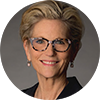Download PDF

Arnold Schwarzenegger recently referred to himself as an “elderly statesman,” a statement that felt odd given his movie roles. But his comment caused me to reflect on the question: What is an elder statesman? A photo of a 95-year-old Jimmy Carter building houses with Habitat for Humanity comes to mind, a reminder that this former president has become a symbol for volunteerism, human rights, and economic development. An elder is someone who may or may not still have an active career but whose presence reminds us of our deeper values.
What are the qualities of an elder in the ophthalmology community?
I think of Stanley Truhlsen, now 100 years old. One of my favorite moments was kneeling beside his wheelchair at the 2019 Orbital Gala when I felt overwhelming respect and affection for him. Dr. Truhlsen certainly had a remarkable career in ophthalmology. He was Academy president in 1983, editor of the Academy’s journal, and on the board of Nebraska Blue Cross Blue Shield, and he helped make the Truhlsen-Marmor Museum of the Eye possible. But it is his kindness, his humility, his integrity, and his life of service that makes him an elder. Stan Truhlsen, by his mere presence, is a reminder that our daily work and our achievements are in service of patients and the public good.
Closer to home, our practice has an annual award that recognizes a physician who embodies our idea of a great colleague. The awardee is selected by the previous year’s honoree, who prepares a presentation about why the person was chosen. We struggled to name the award. After first calling it the Golden Globe Award and then the Collegiality Award (which reminded me of a Miss America contest), we finally decided to name it after a beloved and now retired partner. Doing so described the intent of the award better than any catchy phrase. He is our elder.
Named lectures are a tradition in academic medicine, and speakers are chosen each year for their expertise, innovative treatments, and fresh perspectives. One of the more interesting aspects of giving a named lecture is to prepare comments about the person for whom the lecture is named. Often the “Named” person had a remarkable academic career, but it’s the person’s character that is frequently highlighted in the speech. Talking about the giants in ophthalmology cultivates the values of an organization. What is said about previous leaders is a clue to the core values of a medical group or program.
Elders don’t have to be elderly, though. Sometimes the people who teach us the most about what it means to be a physician are active clinicians and academicians. Fellowship training is often the most intense mentoring experience of our career, though it can be decades before the full impact of those relationships is realized. Sarwat Salim, who did her glaucoma fellowship with Bruce Shields, recently told me that he still stays in close contact with her. She credits Bruce with teaching her not only how to be a glaucoma specialist but also how to treat patients with dignity and colleagues with kindness.
Let’s recognize our elders and our mentors. The Academy’s Foundation is offering a unique opportunity to honor our mentors (aao.org/foundation/honor-a-mentor). Foundation Chair—and mentor to many—Gregory Skuta, MD said, “All of us have been profoundly impacted by special mentors during our careers, whether a particularly memorable teacher during our residency or fellowship or a treasured colleague who has helped guide us professionally and personally.”
In a tribute to Dan Jones, Jane Edmond wrote, “I love and admire DBJ’s brilliance, memorable bon mots, and instilling in me the drive to strive for excellence.” With a tribute gift to the Foundation, you and your mentor will be acknowledged in next year’s Foundation annual report.
I can’t wait to read about the people who have shaped each of you and shaped our profession. And next month: Ophthalmologist the Younger.